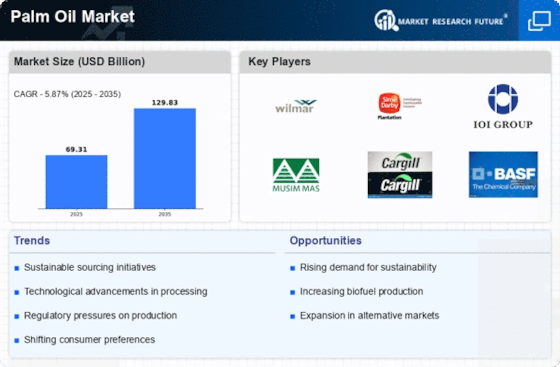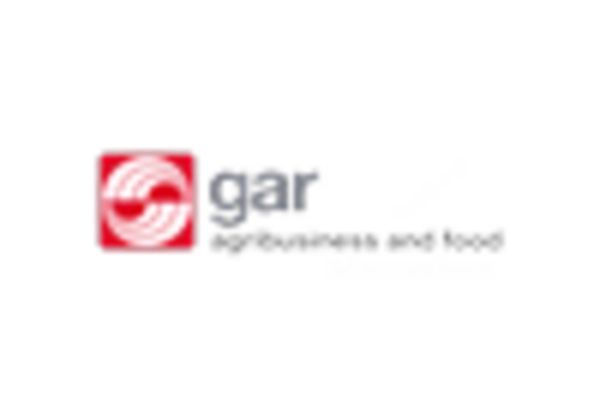Food Industry
Personal Care Products
Biofuels
Animal Feed
Industrial Lubricants
Crude Palm Oil
Refined Palm Oil
Palm Kernel Oil
Fractionated Palm Oil
Direct Sales
Retail
E-commerce
Wholesale
Food Processing
Cosmetics Manufacturing
Energy Production
Chemical Manufacturing
North America
Europe
South America
Asia Pacific
Middle East and Africa
North America Outlook (USD Billion, 2019-2035)
Palm Oil Market by Application Type
Food Industry
Personal Care Products
Biofuels
Animal Feed
Industrial Lubricants
Palm Oil Market by Form Type
Crude Palm Oil
Refined Palm Oil
Palm Kernel Oil
Fractionated Palm Oil
Palm Oil Market by Distribution Channel Type
Direct Sales
Retail
E-commerce
Wholesale
Palm Oil Market by End Use Type
Food Processing
Cosmetics Manufacturing
Energy Production
Chemical Manufacturing
Palm Oil Market by Regional Type
US
Canada
US Outlook (USD Billion, 2019-2035)
Palm Oil Market by Application Type
Food Industry
Personal Care Products
Biofuels
Animal Feed
Industrial Lubricants
Palm Oil Market by Form Type
Crude Palm Oil
Refined Palm Oil
Palm Kernel Oil
Fractionated Palm Oil
Palm Oil Market by Distribution Channel Type
Direct Sales
Retail
E-commerce
Wholesale
Palm Oil Market by End Use Type
Food Processing
Cosmetics Manufacturing
Energy Production
Chemical Manufacturing
CANADA Outlook (USD Billion, 2019-2035)
Palm Oil Market by Application Type
Food Industry
Personal Care Products
Biofuels
Animal Feed
Industrial Lubricants
Palm Oil Market by Form Type
Crude Palm Oil
Refined Palm Oil
Palm Kernel Oil
Fractionated Palm Oil
Palm Oil Market by Distribution Channel Type
Direct Sales
Retail
E-commerce
Wholesale
Palm Oil Market by End Use Type
Food Processing
Cosmetics Manufacturing
Energy Production
Chemical Manufacturing
Europe Outlook (USD Billion, 2019-2035)
Europe Palm Oil Palm Oil Market by Application Type
Food Industry
Personal Care Products
Biofuels
Animal Feed
Industrial Lubricants
Palm Oil Market by Form Type
Crude Palm Oil
Refined Palm Oil
Palm Kernel Oil
Fractionated Palm Oil
Palm Oil Market by Distribution Channel Type
Direct Sales
Retail
E-commerce
Wholesale
Palm Oil Market by End Use Type
Food Processing
Cosmetics Manufacturing
Energy Production
Chemical Manufacturing
Palm Oil Market by Regional Type
Germany
UK
France
Russia
Italy
Spain
Rest of Europe
GERMANY Outlook (USD Billion, 2019-2035)
Palm Oil Market by Application Type
Food Industry
Personal Care Products
Biofuels
Animal Feed
Industrial Lubricants
Palm Oil Market by Form Type
Crude Palm Oil
Refined Palm Oil
Palm Kernel Oil
Fractionated Palm Oil
Palm Oil Market by Distribution Channel Type
Direct Sales
Retail
E-commerce
Wholesale
Palm Oil Market by End Use Type
Food Processing
Cosmetics Manufacturing
Energy Production
Chemical Manufacturing
UK Outlook (USD Billion, 2019-2035)
Palm Oil Market by Application Type
Food Industry
Personal Care Products
Biofuels
Animal Feed
Industrial Lubricants
Palm Oil Market by Form Type
Crude Palm Oil
Refined Palm Oil
Palm Kernel Oil
Fractionated Palm Oil
Palm Oil Market by Distribution Channel Type
Direct Sales
Retail
E-commerce
Wholesale
Palm Oil Market by End Use Type
Food Processing
Cosmetics Manufacturing
Energy Production
Chemical Manufacturing
FRANCE Outlook (USD Billion, 2019-2035)
Palm Oil Market by Application Type
Food Industry
Personal Care Products
Biofuels
Animal Feed
Industrial Lubricants
Palm Oil Market by Form Type
Crude Palm Oil
Refined Palm Oil
Palm Kernel Oil
Fractionated Palm Oil
Palm Oil Market by Distribution Channel Type
Direct Sales
Retail
E-commerce
Wholesale
Palm Oil Market by End Use Type
Food Processing
Cosmetics Manufacturing
Energy Production
Chemical Manufacturing
RUSSIA Outlook (USD Billion, 2019-2035)
Palm Oil Market by Application Type
Food Industry
Personal Care Products
Biofuels
Animal Feed
Industrial Lubricants
Palm Oil Market by Form Type
Crude Palm Oil
Refined Palm Oil
Palm Kernel Oil
Fractionated Palm Oil
Palm Oil Market by Distribution Channel Type
Direct Sales
Retail
E-commerce
Wholesale
Palm Oil Market by End Use Type
Food Processing
Cosmetics Manufacturing
Energy Production
Chemical Manufacturing
ITALY Outlook (USD Billion, 2019-2035)
Palm Oil Market by Application Type
Food Industry
Personal Care Products
Biofuels
Animal Feed
Industrial Lubricants
Palm Oil Market by Form Type
Crude Palm Oil
Refined Palm Oil
Palm Kernel Oil
Fractionated Palm Oil
Palm Oil Market by Distribution Channel Type
Direct Sales
Retail
E-commerce
Wholesale
Palm Oil Market by End Use Type
Food Processing
Cosmetics Manufacturing
Energy Production
Chemical Manufacturing
SPAIN Outlook (USD Billion, 2019-2035)
Palm Oil Market by Application Type
Food Industry
Personal Care Products
Biofuels
Animal Feed
Industrial Lubricants
Palm Oil Market by Form Type
Crude Palm Oil
Refined Palm Oil
Palm Kernel Oil
Fractionated Palm Oil
Palm Oil Market by Distribution Channel Type
Direct Sales
Retail
E-commerce
Wholesale
Palm Oil Market by End Use Type
Food Processing
Cosmetics Manufacturing
Energy Production
Chemical Manufacturing
REST OF EUROPE Outlook (USD Billion, 2019-2035)
Palm Oil Market by Application Type
Food Industry
Personal Care Products
Biofuels
Animal Feed
Industrial Lubricants
Palm Oil Market by Form Type
Crude Palm Oil
Refined Palm Oil
Palm Kernel Oil
Fractionated Palm Oil
Palm Oil Market by Distribution Channel Type
Direct Sales
Retail
E-commerce
Wholesale
Palm Oil Market by End Use Type
Food Processing
Cosmetics Manufacturing
Energy Production
Chemical Manufacturing
APAC Outlook (USD Billion, 2019-2035)
Palm Oil Market by Application Type
Food Industry
Personal Care Products
Biofuels
Animal Feed
Industrial Lubricants
Palm Oil Market by Form Type
Crude Palm Oil
Refined Palm Oil
Palm Kernel Oil
Fractionated Palm Oil
Palm Oil Market by Distribution Channel Type
Direct Sales
Retail
E-commerce
Wholesale
Palm Oil Market by End Use Type
Food Processing
Cosmetics Manufacturing
Energy Production
Chemical Manufacturing
Palm Oil Market by Regional Type
China
India
Japan
South Korea
Malaysia
Thailand
Indonesia
Rest of APAC
CHINA Outlook (USD Billion, 2019-2035)
Palm Oil Market by Application Type
Food Industry
Personal Care Products
Biofuels
Animal Feed
Industrial Lubricants
Palm Oil Market by Form Type
Crude Palm Oil
Refined Palm Oil
Palm Kernel Oil
Fractionated Palm Oil
Palm Oil Market by Distribution Channel Type
Direct Sales
Retail
E-commerce
Wholesale
Palm Oil Market by End Use Type
Food Processing
Cosmetics Manufacturing
Energy Production
Chemical Manufacturing
INDIA Outlook (USD Billion, 2019-2035)
Palm Oil Market by Application Type
Food Industry
Personal Care Products
Biofuels
Animal Feed
Industrial Lubricants
Palm Oil Market by Form Type
Crude Palm Oil
Refined Palm Oil
Palm Kernel Oil
Fractionated Palm Oil
Palm Oil Market by Distribution Channel Type
Direct Sales
Retail
E-commerce
Wholesale
Palm Oil Market by End Use Type
Food Processing
Cosmetics Manufacturing
Energy Production
Chemical Manufacturing
JAPAN Outlook (USD Billion, 2019-2035)
Palm Oil Market by Application Type
Food Industry
Personal Care Products
Biofuels
Animal Feed
Industrial Lubricants
Palm Oil Market by Form Type
Crude Palm Oil
Refined Palm Oil
Palm Kernel Oil
Fractionated Palm Oil
Palm Oil Market by Distribution Channel Type
Direct Sales
Retail
E-commerce
Wholesale
Palm Oil Market by End Use Type
Food Processing
Cosmetics Manufacturing
Energy Production
Chemical Manufacturing
SOUTH KOREA Outlook (USD Billion, 2019-2035)
Palm Oil Market by Application Type
Food Industry
Personal Care Products
Biofuels
Animal Feed
Industrial Lubricants
Palm Oil Market by Form Type
Crude Palm Oil
Refined Palm Oil
Palm Kernel Oil
Fractionated Palm Oil
Palm Oil Market by Distribution Channel Type
Direct Sales
Retail
E-commerce
Wholesale
Palm Oil Market by End Use Type
Food Processing
Cosmetics Manufacturing
Energy Production
Chemical Manufacturing
MALAYSIA Outlook (USD Billion, 2019-2035)
Palm Oil Market by Application Type
Food Industry
Personal Care Products
Biofuels
Animal Feed
Industrial Lubricants
Palm Oil Market by Form Type
Crude Palm Oil
Refined Palm Oil
Palm Kernel Oil
Fractionated Palm Oil
Palm Oil Market by Distribution Channel Type
Direct Sales
Retail
E-commerce
Wholesale
Palm Oil Market by End Use Type
Food Processing
Cosmetics Manufacturing
Energy Production
Chemical Manufacturing
THAILAND Outlook (USD Billion, 2019-2035)
Palm Oil Market by Application Type
Food Industry
Personal Care Products
Biofuels
Animal Feed
Industrial Lubricants
Palm Oil Market by Form Type
Crude Palm Oil
Refined Palm Oil
Palm Kernel Oil
Fractionated Palm Oil
Palm Oil Market by Distribution Channel Type
Direct Sales
Retail
E-commerce
Wholesale
Palm Oil Market by End Use Type
Food Processing
Cosmetics Manufacturing
Energy Production
Chemical Manufacturing
INDONESIA Outlook (USD Billion, 2019-2035)
Palm Oil Market by Application Type
Food Industry
Personal Care Products
Biofuels
Animal Feed
Industrial Lubricants
Palm Oil Market by Form Type
Crude Palm Oil
Refined Palm Oil
Palm Kernel Oil
Fractionated Palm Oil
Palm Oil Market by Distribution Channel Type
Direct Sales
Retail
E-commerce
Wholesale
Palm Oil Market by End Use Type
Food Processing
Cosmetics Manufacturing
Energy Production
Chemical Manufacturing
REST OF APAC Outlook (USD Billion, 2019-2035)
Palm Oil Market by Application Type
Food Industry
Personal Care Products
Biofuels
Animal Feed
Industrial Lubricants
Palm Oil Market by Form Type
Crude Palm Oil
Refined Palm Oil
Palm Kernel Oil
Fractionated Palm Oil
Palm Oil Market by Distribution Channel Type
Direct Sales
Retail
E-commerce
Wholesale
Palm Oil Market by End Use Type
Food Processing
Cosmetics Manufacturing
Energy Production
Chemical Manufacturing
South America Outlook (USD Billion, 2019-2035)
Palm Oil Market by Application Type
Food Industry
Personal Care Products
Biofuels
Animal Feed
Industrial Lubricants
Palm Oil Market by Form Type
Crude Palm Oil
Refined Palm Oil
Palm Kernel Oil
Fractionated Palm Oil
Palm Oil Market by Distribution Channel Type
Direct Sales
Retail
E-commerce
Wholesale
Palm Oil Market by End Use Type
Food Processing
Cosmetics Manufacturing
Energy Production
Chemical Manufacturing
Palm Oil Market by Regional Type
Brazil
Mexico
Argentina
Rest of South America
BRAZIL Outlook (USD Billion, 2019-2035)
BRAZIL Palm Oil Palm Oil Market by Application Type
Food Industry
Personal Care Products
Biofuels
Animal Feed
Industrial Lubricants
Palm Oil Market by Form Type
Crude Palm Oil
Refined Palm Oil
Palm Kernel Oil
Fractionated Palm Oil
Palm Oil Market by Distribution Channel Type
Direct Sales
Retail
E-commerce
Wholesale
Palm Oil Market by End Use Type
Food Processing
Cosmetics Manufacturing
Energy Production
Chemical Manufacturing
MEXICO Outlook (USD Billion, 2019-2035)
Palm Oil Market by Application Type
Food Industry
Personal Care Products
Biofuels
Animal Feed
Industrial Lubricants
Palm Oil Market by Form Type
Crude Palm Oil
Refined Palm Oil
Palm Kernel Oil
Fractionated Palm Oil
Palm Oil Market by Distribution Channel Type
Direct Sales
Retail
E-commerce
Wholesale
Palm Oil Market by End Use Type
Food Processing
Cosmetics Manufacturing
Energy Production
Chemical Manufacturing
ARGENTINA Outlook (USD Billion, 2019-2035)
Palm Oil Market by Application Type
Food Industry
Personal Care Products
Biofuels
Animal Feed
Industrial Lubricants
Palm Oil Market by Form Type
Crude Palm Oil
Refined Palm Oil
Palm Kernel Oil
Fractionated Palm Oil
Palm Oil Market by Distribution Channel Type
Direct Sales
Retail
E-commerce
Wholesale
Palm Oil Market by End Use Type
Food Processing
Cosmetics Manufacturing
Energy Production
Chemical Manufacturing
REST OF SOUTH AMERICA Outlook (USD Billion, 2019-2035)
Palm Oil Market by Application Type
Food Industry
Personal Care Products
Biofuels
Animal Feed
Industrial Lubricants
Palm Oil Market by Form Type
Crude Palm Oil
Refined Palm Oil
Palm Kernel Oil
Fractionated Palm Oil
Palm Oil Market by Distribution Channel Type
Direct Sales
Retail
E-commerce
Wholesale
Palm Oil Market by End Use Type
Food Processing
Cosmetics Manufacturing
Energy Production
Chemical Manufacturing
MEA Outlook (USD Billion, 2019-2035)
Palm Oil Market by Application Type
Food Industry
Personal Care Products
Biofuels
Animal Feed
Industrial Lubricants
Palm Oil Market by Form Type
Crude Palm Oil
Refined Palm Oil
Palm Kernel Oil
Fractionated Palm Oil
Palm Oil Market by Distribution Channel Type
Direct Sales
Retail
E-commerce
Wholesale
Palm Oil Market by End Use Type
Food Processing
Cosmetics Manufacturing
Energy Production
Chemical Manufacturing
Palm Oil Market by Regional Type
GCC Countries
South Africa
Rest of MEA
GCC COUNTRIES Outlook (USD Billion, 2019-2035)
Palm Oil Market by Application Type
Food Industry
Personal Care Products
Biofuels
Animal Feed
Industrial Lubricants
Palm Oil Market by Form Type
Crude Palm Oil
Refined Palm Oil
Palm Kernel Oil
Fractionated Palm Oil
Palm Oil Market by Distribution Channel Type
Direct Sales
Retail
E-commerce
Wholesale
Palm Oil Market by End Use Type
Food Processing
Cosmetics Manufacturing
Energy Production
Chemical Manufacturing
SOUTH AFRICA Outlook (USD Billion, 2019-2035)
Palm Oil Market by Application Type
Food Industry
Personal Care Products
Biofuels
Animal Feed
Industrial Lubricants
Palm Oil Market by Form Type
Crude Palm Oil
Refined Palm Oil
Palm Kernel Oil
Fractionated Palm Oil
Palm Oil Market by Distribution Channel Type
Direct Sales
Retail
E-commerce
Wholesale
Palm Oil Market by End Use Type
Food Processing
Cosmetics Manufacturing
Energy Production
Chemical Manufacturing
REST OF MEA Outlook (USD Billion, 2019-2035)
Palm Oil Market by Application Type
Food Industry
Personal Care Products
Biofuels
Animal Feed
Industrial Lubricants
Palm Oil Market by Form Type
Crude Palm Oil
Refined Palm Oil
Palm Kernel Oil
Fractionated Palm Oil
Palm Oil Market by Distribution Channel Type
Direct Sales
Retail
E-commerce
Wholesale
Palm Oil Market by End Use Type
Food Processing
Cosmetics Manufacturing
Energy Production
Chemical Manufacturing



















Leave a Comment